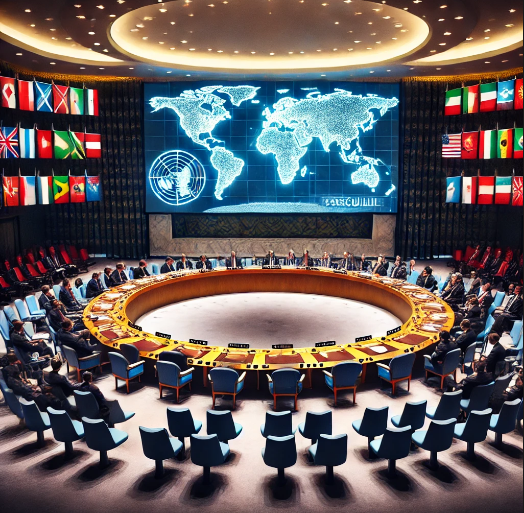The United Nations Security Council (UNSC) serves as one of the most important bodies responsible for maintaining international peace and security. Established in 1945, after the devastating impacts of World War II, the UNSC plays a critical role in addressing conflicts, promoting diplomacy, and ensuring that nations abide by the tenets of international law. As the world grows more interconnected, with increasing security challenges from cyber threats to terrorism and climate-induced conflicts, the role of the UNSC has become even more significant. In this article, we explore the UNSC’s mission, structure, functions, and the emerging challenges it faces in today’s evolving geopolitical landscape.
Structure of the UN Security Council
The UNSC consists of 15 member states, of which five are permanent members (the P5): the United States, Russia, China, the United Kingdom, and France. These nations hold a unique position as they have veto power, allowing any one of them to block resolutions even if the majority of other members agree. The other 10 members are elected on a rotating basis from various regions around the world, with each serving a two-year term.
The P5 countries were selected based on their global influence at the time of the UNSC’s inception, with the idea that they would be the primary custodians of world peace. However, the veto power often stirs controversy, as it has been used to block potentially life-saving interventions and peacekeeping efforts in regions where geopolitical interests clash. Non-permanent members, while lacking the veto, still have an important role in shaping debates and ensuring that global voices are represented.
Functions and Responsibilities
The UNSC’s primary responsibility is maintaining international peace and security. Its main functions include:
1. Conflict Resolution: The UNSC mediates in conflicts by facilitating diplomatic dialogue, peace talks, and, when necessary, authorizing military interventions to protect civilians.
2. Peacekeeping Missions: When diplomatic efforts fail, the UNSC can deploy peacekeeping forces to conflict zones. These forces help stabilize regions, protect vulnerable populations, and support post-conflict recovery efforts.
3. Sanctions: The UNSC can impose sanctions on nations or groups that jeopardize international security. These sanctions may include trade restrictions, arms embargoes, travel bans, or financial freezes to curb aggressive actions.
4. Humanitarian Assistance: The UNSC works alongside humanitarian organizations to ensure aid reaches regions affected by war or natural disasters. They oversee and authorize aid missions that protect human rights and ensure relief reaches those in need.
5. Counterterrorism: The UNSC actively addresses global terrorism threats by coordinating international efforts, establishing frameworks for combating terrorism financing, and ensuring member states implement necessary security measures.
Emerging Security Challenges
While traditional state conflicts and military aggression remain core concerns, the UNSC has faced an increasing array of modern security challenges that require adaptive strategies.
1. Cybersecurity Threats: In today’s digital age, cyberattacks pose a growing threat to national security. Nations are increasingly using cyberwarfare as a tool to disrupt economies, influence elections, and attack critical infrastructure. The UNSC must work with member nations to establish frameworks for addressing these new types of warfare.
2. Climate Change as a Security Threat: Climate change is an emerging concern for global security. Rising sea levels, extreme weather, and resource shortages caused by climate disruptions are contributing to conflicts, particularly in vulnerable regions. The UNSC has been called upon to integrate climate resilience into its peacekeeping and conflict prevention strategies.
3. Global Health Crises: The COVID-19 pandemic underscored the impact that global health crises can have on security. The UNSC has recognized that pandemics can destabilize economies, fuel geopolitical tensions, and weaken national security. This has pushed the council to address biosecurity and health preparedness as integral to global stability.
4. Nuclear Proliferation: The threat of nuclear weapons remains a significant concern for the UNSC. Countries like North Korea and Iran have tested the boundaries of international agreements on nuclear disarmament. The UNSC must ensure that diplomatic channels remain open while enforcing strict non-proliferation treaties.
5. Migration and Displacement: Armed conflicts and environmental crises have contributed to large-scale displacement, triggering mass migrations. The UNSC has a responsibility to address the humanitarian and security risks associated with displaced populations, from managing refugee flows to ensuring their rights and safety in host countries.
The Role of Diplomacy in Conflict Resolution
Diplomacy lies at the heart of the UNSC’s work. In addressing international disputes, the council often plays a mediator role, encouraging dialogue and negotiation between warring factions or countries. This often involves appointing special envoys, facilitating ceasefires, and hosting peace conferences to ensure that disputes do not escalate into full-blown wars. The UNSC’s success, however, depends heavily on the political will of its members.
When diplomatic solutions fail, the UNSC can resort to more assertive measures, such as economic sanctions or peacekeeping operations. However, these approaches are not without criticism. Some argue that sanctions disproportionately harm civilians, while peacekeeping missions can face logistical challenges, such as insufficient resources or complex local political landscapes.
Reforming the UN Security Council
In recent decades, the call for reform within the UNSC has grown louder. Critics argue that the council’s structure, established in the post-World War II era, no longer reflects the realities of modern geopolitics. The concentration of power within the P5 and the frequent use of the veto have often paralyzed decision-making, especially during critical global crises such as the Syrian civil war.
Countries from regions like Africa, Latin America, and the Middle East seek more significant representation and say in the UNSC. Reform proposals include expanding the council’s membership, limiting veto powers, and ensuring a more democratic decision-making process.
Despite these criticisms, the UNSC remains one of the most critical international organizations dedicated to maintaining peace and security. Its ability to respond to global crises, facilitate dialogue, and coordinate humanitarian aid ensures it remains central to addressing the world’s most pressing challenges.
Conclusion
The UN Security Council has evolved in response to the shifting global landscape, from traditional warfare to modern security challenges like cyber threats and climate-induced conflicts. Its work remains vital in ensuring international peace and security, but reform is essential to ensure its effectiveness in today’s complex world. The future of global security will depend on how well the UNSC can adapt to emerging threats while maintaining its core mission of safeguarding the peace and stability of nations. As we move forward, it is crucial for the international community to support and strengthen this institution to meet the challenges of tomorrow.





